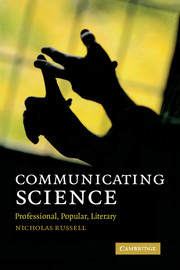Book contents
- Frontmatter
- Contents
- Introduction: What this book is about and why you might want to read it
- Prologue: Three orphans share a common paternity: professional science communication, popular journalism and literary fiction are not as separate as they seem
- Part I Professional science communication
- Part II Science for the public: what science do people need and how might they get it?
- Part III Popular science communication: the press and broadcasting
- Part IV The origins of science in cultural context: five historic dramas
- Part V Science in literature
- 20 Science and the Gothic: the three big nineteenth-century monster stories
- 21 Science fiction: serious literature or low grade entertainment?
- 22 Science in British literary fiction
- 23 Science on stage: the politics and ethics of science in cultural and educational contexts
- Index
- References
23 - Science on stage: the politics and ethics of science in cultural and educational contexts
Published online by Cambridge University Press: 02 December 2010
- Frontmatter
- Contents
- Introduction: What this book is about and why you might want to read it
- Prologue: Three orphans share a common paternity: professional science communication, popular journalism and literary fiction are not as separate as they seem
- Part I Professional science communication
- Part II Science for the public: what science do people need and how might they get it?
- Part III Popular science communication: the press and broadcasting
- Part IV The origins of science in cultural context: five historic dramas
- Part V Science in literature
- 20 Science and the Gothic: the three big nineteenth-century monster stories
- 21 Science fiction: serious literature or low grade entertainment?
- 22 Science in British literary fiction
- 23 Science on stage: the politics and ethics of science in cultural and educational contexts
- Index
- References
Summary
Henrik Ibsen's play, An Enemy of the People, was published in 1882. The hero (or anti-hero according to taste) is the physician Dr Tomas Stockmann who cannot understand why his scientific demonstration that a local pulp mill is poisoning the water supply is not accepted by any segment of local society; industry, politicians, the media or ordinary people. But acknowledging and dealing with the problem is not in any of their short-term interests. It will cost the mill owners money, politicians and the media do not want to ruin the tourist trade, and local labour leaders do not want workers to lose their jobs, so at a public meeting Stockmann is branded an enemy of the people. Scientists might like to read this play as an attack on the small-mindedness and stupidity of non-scientists in the face of heroic efforts by a scientist to improve their lot. But the opposite reading is equally valid; the scientist is naïve if he supposes that scientific analysis alone can solve the problem, if the practical consequences so clearly go against the political realities of the lives of those affected.
Something similar happens in William Golding's play The Brass Butterfly (1958) where an inventor is banished from ancient Rome for railing against people and politicians who will not use his machines for human benefit rather than to gain political power and destroy their enemies. The politicians banish him because such a dangerous idealist is better out of the way.
- Type
- Chapter
- Information
- Communicating ScienceProfessional, Popular, Literary, pp. 301 - 315Publisher: Cambridge University PressPrint publication year: 2009



